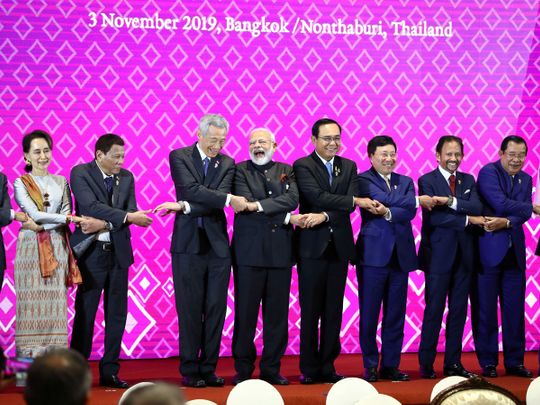
Delhi (Agencies): India is committed to further improving its people-friendly tax regime, Prime Minister Narendra Modi said, as Asia’s third-largest economy seeks to attract more overseas investment to spur growth.
The government has cut corporate tax rates and introduced a nationwide goods-and-services charge (GST) to integrate the nation’s economy, Modi said in a speech at Aditya Bira Group’s golden jubilee celebrations in Thailand on Sunday. “We want to work toward making it even more people friendly,” he said.
Attracting new investment is key to creating jobs and boosting growth in the economy, which slowed to a six-year low growth rate of 5 per cent in the quarter ended June. India is considering tax relief for individuals as it looks at measures to accelerate consumer demand.
India’s trade stance
Meanwhile, there is hectic behind the scenes activity to try to salvage a Asian trade deal following new demands from India. Hopes of finalising the Asia-wide “Regional Comprehensive Economic Partnership” (RCEP), which is backed by China, had been thrown into doubt at the summit of the Association of Southeast Asian Nations (ASEAN) in Bangkok.
Indian Prime Minister Narendra Modi did not even mention the RCEP deal in opening remarks at a meeting with Southeast Asian leaders and instead spoke only of reviewing the existing trade agreement between ASEAN and India.
“This will help not only further strengthen our economic relations, but our trade will also be more balanced,” Modi said.
Flood of China-made goods
The 16 countries in RCEP would account for a third of global gross domestic product and nearly half the world’s population. But India is worried about a potential flood of Chinese imports.
Southeast Asian countries had hoped at least a provisional agreement could be announced on Monday. “We should continue to work to conclude negotiations on the RCEP within this year to stimulate economic growth, as well as trade and investment,” Thai Prime Minister Prayuth Chan-ocha told the formal opening of the ASEAN summit.
He highlighted the risks of “trade frictions” and “geo-strategic competition” in a region where the trade tensions between the US and China have helped drive growth to its slowest in five years in 2019.
An Asia deal without India?
Some countries have raised the possibility of moving ahead without India on forming a bloc that also included Japan, South Korea, Australia and New Zealand.
But Thai commerce minister Jurin Laksanawisit said that India had not pulled out and all was good on RCEP negotiations. Another advantage for Southeast Asian countries of having India in the trade pact is that it would be less dominated by China.
The US decision to send a lower level delegation to the summits this year has raised regional concerns that it can no longer be relied on as a counterweight to China’s increasing regional might.












